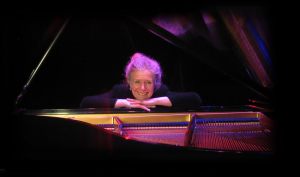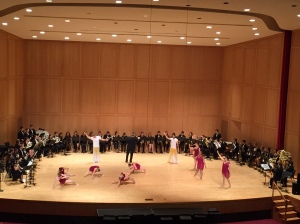Final Convocation Speech
It is my good fortune to have the honor to address you, for the fifth and sadly, final time as dean of this grand School of Music. Like these seniors, I am, in a way, graduating, and this is my opportunity to see these events through the eyes of a senior. There is some symmetry to the fact that it took 5 years for me to complete my own undergraduate degree, (more years, in fact, that it took for my masters and doctorate combined), and that I have once again spent 5 years in music school. These have been five good years, and like the other seniors are realizing, it seems like time to celebrate. Graduation, or another semester accomplished, could be a time to look back at all that you have accomplished. It could be time to give yourself a good pat on the back for all that you have done. Celebratory occasions are for that purpose—the celebration of accomplishment and in this case your accomplishment.
Yet in a larger way, this is also the opportunity to pause and realize, we didn’t do this alone. Times of celebration often disguise opportunities to give thanks. Did you accomplish this on your own? Of course not. No one does. But who to thank? What would happen if we all stopped for just a moment and thought, “Who do I thank?” Go Ahead. I’ll wait. I’m serious. Take a moment and think who to thank.
Now I would imagine Mom and Dad immediately pop to mind. Good. They should. Parental sacrifice for the good of their kids is legendary, and often thankless so it is good they come to mind. I remember giving my father a coffee cup that said, “The old man is usually right but by the time you figure that out, you have kids of your own who think you are usually wrong.” True, that.
I’ll bet next came your teachers. Good. You are right again. These are the people who have helped you most to grow into who you now are. They changed you—for better and for good and you will quickly realize that the professors you had here are the best out there. They have set a high standard for the future professors you will have and that will be no easy hurdle for those professors to clear. You’ve thought thanks, now lets show thanks. How about a round of applause for your teachers? And I hope you will find other ways to say thanks before your leave for the summer or the rest of your life. A round of applause is small recompense for all they have done.
Now who? How about the staff? The office staff managed your every need? You lived in a beautiful space all these years. Have you thanked Randy or the grounds crew or the facilities staff lately? How about the Ladies of Café Allegro? (You folks are gonna miss that coffee shop next year when move it into the president’s office;). You see, there are a lot of people to thank and you don’t have much time left here. Better get to it.
So there you have it- -the only graduation speech with a homework assignment. Give thanks. A lot. Before you go. Some of these folks you may never meet again in this lifetime.
I have been blessed to be your dean. I can look you in the eye and say that I did my best. Every action I took, without exception, were the actions I thought necessary to give you the most extraordinary education possible. I’ll ask forgiveness for the things you blame me for and I’ll ask you to pay forward the things you appreciated. And I will say thanks to all who made these things possible.
Throughout my time in this school, I have reminded you of your obligation to make the world a better place with your talent. Just one note changes the world. For better and for good.
For Good (from Wicked)
I’ve heard it said
That people come into our lives for a reason
Bringing something we must learn
And we are led
To those who help us most to grow
If we let them
And we help them in return
Well, I don’t know if I believe that’s true
But I know I’m who I am today
Because I knew you…
Like a comet pulled from orbit
As it passes a sun
Like a stream that meets a boulder
Halfway through the wood
Who can say if I’ve been changed for the better?
But because I knew you
I have been changed for good
It well may be
That we will never meet again
In this lifetime
So let me say before we part
So much of me
Is made of what I learned from you
You’ll be with me Like a handprint on my heart
And now whatever way our stories end
I know you have re-written mine
By being my friend…
Like a ship blown from its mooring By a wind off the sea
Like a seed dropped by a skybird In a distant wood
Who can say if I’ve been changed for the better?
But because I knew you
I have been changed for good
And just to clear the air I ask forgiveness
For the things I’ve done, you blame me for
But then, I guess we know There’s blame to share
And none of it seems to matter anymore
| Like a comet pulled from orbit As it passes the sun Like a stream that meets a boulder Halfway through the wood |
Like a ship blown from its mooring By a wind off the sea Like a seed dropped by a bird In the wood |
I do believe I have been
Changed for the better
And because I knew you
I have been changed for good
And off we go…
Yesterday was our first recital hour performance of the year and what a recital it was. I was mesmerized by the quality and variety of these performances. First-years to seniors, singers to harpists, wistful to willful–this recital brought a diversity of performers and performances to our stage– all of them, stellar. And just in time, too.
DePauw has a winter term– a time for great exploration (our chamber singers toured France, some students followed the footsteps of Messiaen) — that takes our students away from campus and around the world. This is truly a good thing. But back home, it makes for a quiet music school–something that is very hard to like.
So yesterday, when the stage erupted in music, I knew we were back. And I was glad. This beautiful building is only truly beautiful when it is filled with the sound of music– at all stages. To a musical school dean, the sound from the practice room is as wonderful as the sound from the stage. Welcome back students. We missed you.
What not to do
When I was younger, I was convinced that the smartest and most successful people in the world knew exactly what to do. Surely, they were successful because they understood what was most important and the right thing to do. As I have gotten older, I realize that the truly successful people of the world understand something far more important: they understand what not to do.
It seems incredible that the most, and least, successful people in the world are limited by the very same thing: time. Think of the most successful person you know. How many hours are in their day? Think of the least successful person you know. How many hours in theirs? Same 24-hour limit–vastly different results.
Time management is such a huge factor that a multi-million dollar industry has sprung up around it. One can spend vast amounts of money (and ironically, vast amounts of time) reading about how to manage time. The truth is, we cannot manage time. We can only manage ourselves within time.
The truth is, we cannot manage time.We can only manage ourselves within time.
How is this even possible? How do we manage ourselves within time? Answer: by choosing what not to do.
This has been an incredibly busy semester. So busy that I have not taken time to write about the great success of the opening of Music on the Square (but I did write about it here), the incredible visit of DeCoda (interview here), our time with A Far Cry (conversation here) or the great visit by Sweet Honey in the Rock (story here).
Much of my time seems to be spent doing rather than telling about the doing (example here) and maybe that is okay. I am trying to learn to manage myself within time and sometimes that means choosing what not to do.
I catch up on this blog during a lull in the action of the National Association of Schools of Music Commission on Accreditation. This is my last service on this commission because I had to decide not to do this any longer so that I had time to do other pressing and important things. It was hard to give up. I enjoy my time with the other commissioners and believe in the work we are doing. I have dedicated three years to this effort. Fortunately, there are many talented people to take my place here. And I will move to the next thing.
Like doing a better job of keeping up on this blog.
Successful students know this all too well. It is choosing not to do this so you have time to do that. There are an infinite number of choices to fill the severely finite limit of time.
I have been involved in higher education across four decades and am still trying to get this right.
We never stop learning.
What a Summer!
Music Convocation Address
Each year at this event I give a short speech. This year, it’s a little different, in that I, too, am a senior this year. Now before the juniors, sophomores and first years get their hopes up, I will not be graduating. I guess I’ll technically be starting over as a freshman next year. In my last job, I was a senior by that math, four times. Four times around the wheel—16 years. Using this math—that every four years you become a senior again—Dr. Balensuela would have been a senior at DePauw at least 5 times. Caroline Smith, at least 6; Dr. Edberg and Dr. Edwards, almost 7. And Orcenith Smith… well, I put that number in my calculator and it began to smoke. You’ll have to do that math yourself.
Two years ago on this occasion I encouraged you to follow Rumi’s advice and “let the beauty you love be what you do.” Last year I talked about how precious every moment of time is. After hearing our performance of the monumental ninth symphony of Beethoven this week and reflecting upon his life, I decided that this year, I’d like to take my few minutes to talk to you about…failure.
Now if you are thinking that failure seems to be the most unlikely topic for a graduation speech in the history of graduation speeches, I would agree. And that is sad. In my career, I have sat through dozens –if not hundreds—of graduation speeches that talk about success: how the world is waiting for you, how this is your time, how many fantastic ways you will succeed. (Truth be told, I have given several of these speeches.) The thing is, we are all pretty good at handling success—it’s not that difficult. What we need to think about, and think about carefully, is how we handle failure.
Thomas Edison famously said he had not failed but had instead come up with 1,000 ways NOT to invent a light bulb. Apparently idea 1001 worked. What if he quit at 999? (I don’t know about you but I am glad we don’t have to light the candelabra chandelier every time we have a concert in Kresge.) That ability to fail and not be destroyed is an important skill—maybe the important skill. The major league baseball batter who held the record for striking out—a record that lasted nearly 30 years? Babe Ruth. An NBA player that missed 26 game-winning shots and lost nearly 300 games in his career is in the Hall of Fame. His name is Michael Jordan. Author Geoff Colvin estimated that figure skater Shizuka Arakawa of Japan, fell more than twenty thousand times on her way to becoming an Olympic champion. “Arakawa’s story is invaluable as a metaphor,” Colvin wrote. “Landing on your butt twenty thousand times is where great performance comes from.” A lawyer from Illinois failed in 2 businesses, then ran for the legislature…and lost. He ran for congress and lost—twice. So he ran for Senate and lost there, too. Twice. Yet Abraham Lincoln is not only one of the most loved presidents in history, he is so because of his response to failure. And repeated failure. And repeated, repeated failure.
The concert we heard Sunday, the immortal Beethoven 9, was written by a composer that lost his ability to hear. Taking away the ears of a composer is akin to taking away the eyes of a painter yet Beethoven persevered. Of course he waivered, of course he despaired, of course he questioned. But then he wrote. Usually writing a new symphony every two years or so, it was 12 years after the 8th before he came back with his greatest symphony—some say the greatest symphony—ever. The final, beloved theme is an ode to: joy! Get that: after lamenting the loss of the one sense that he said “should have been more perfect in me,” and citing his “state of endless suffering,” he perseveres to write an Ode to Joy.
Carol Dweck, in a brilliant book called “Mindset” explains this phenomenon. She says we all have one of two mindsets: The “fixed” mindset or the “growth” mindset. She states:
“The view you adopt for yourself profoundly affects the way you lead your life. It can determine whether you become the person you want to be and whether you accomplish the things you value.
It seems that those of us with the fixed mindset are convinced that we are what we are, our talents and abilities are fixed and that we must hide our deficiencies. Failure is to be avoided at all cost.
She goes on to tell us that the growth mindset is based on the belief that your basic qualities are things you can cultivate through your efforts. She asks,
“Why waste time proving over and over how great you are, when you could be getting better? Why hide deficiencies instead of overcoming them? Why look for friends or partners who will just shore up your self-esteem instead of ones who will also challenge you to grow? The passion for stretching yourself and sticking to it, even (or especially) when it’s not going well, is the hallmark of the growth mindset. This is the mindset that allows people to thrive during some of the most challenging times in their lives.
Sounds like Beethoven, doesn’t it? Think back to the opening of that final movement. A frightening fanfare sounds like the opening of the curtain, and the cellos and basses seem to ask, “Okay Beethoven, you’ve written nine of these things now, what have you got?” He offers a theme from an earlier movement—“No!” the cellos interrupt. He offers another—not good enough! “Not these tones, but ones more joyful.” And the soloists and the chorus and the orchestra erupt with an ode to joy that has captivated the entire world ever since. Where would he be had he quit? Where would we be?
Ken Rea, in a great book called “The Outstanding Actor” says, “The fixed mindset makes you concerned with how you will be judged, the growth mindset makes you focus on improving.” In his aptly entitled book, “Bounce,” Matthew Syed says,
“It is about stepping outside the comfort zone, training with a spirit of endeavor, and accepting the inevitability of trials and tribulations. Progress is built, in effect, upon the foundations of necessary failure.”
And that is the thought I want to leave you with. Necessary failure. The question is not will you fail? Of course you will. The question is what will you do with it? Will you hide it, shun it, rationalize it, deny it? Or will you embrace it for what it is—inevitable and necessary. We don’t expect you to invent the light bulb or win a gold medal or be in the hall of fame. We expect something far more important. We expect you to become the best “you” you can possibly be—that person who lives a life of meaning and purpose, and beauty, and who realizes that inevitable, necessary failures are what made you that person.
I wish you every success.
And the success of every failure.
Around the World in 45 Minutes….
There are more things in heaven and earth than are dreamt of in your philosophy…
William Shakespeare
Today the music school was transported around the world in 45 minutes in a student designed, led and performed recital. I was mesmerized by the presentation and the performances as students, many representing their home countries or cultures, took us from Indiana to Japan, China, Australia, Bulgaria, Romania, Cuba, Venezuela and Brazil (all without airport delays, bad food or jet lag). The performers and the performances were simply stellar. I was amazed at how much could be felt about these cultures with a few pictures, a movie clip or two and some fascinating music, well-played. Music’s ability to transcend space and time still astounds. Shakespeare understood. There are things in heaven and earth not dreamt of in our philosophies…
Thanks to all involved. It was a great trip.
What Students Can Do
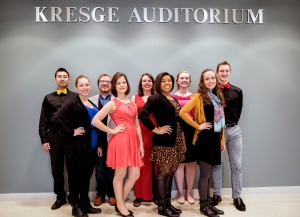
I am just home from a delightful evening of great music with the DePauw Symphony Orchestra and their concerto winners– a concert featuring nine stellar students taking the soloist role before a full orchestra. Playing in a full orchestra can be intimidating–soloing in front of one can be terrifying–yet these students performed with grace and aplomb beyond their years. Opera arias, romantic concerti–even American standards were on display in an incredibly high-caliber performance by orchestra and soloist alike. The audience clearly loved every moment and was moved to clap and cheer and finally stand in homage to these incredible performers and incredible performances. It was a great night.
I am always amazed at what students can do. They are always more capable than we can even imagine and never cease to amaze with performances that enthrall.
What students can do this?
DePauw students can.
And they do.
What I Learned
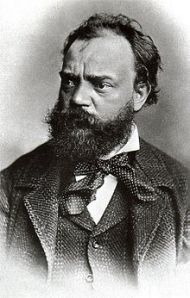
It is common knowledge that deans are great at expounding upon what they did or what they taught. After our two-week Dvořák Festival, I am overwhelmed at what I learned. It was the opportunity to return to the role of learner that I relished the most about our most recent effort in the School of Music here at DePauw.
This is the welcome I wrote for the program book. It explains why we took this on. Here is the program book itself. It outlines exactly what we took on. (It was a massive undertaking so the how we took this on would take too many words to explain.)
So here, in no particular order, are a few of my epiphanies—the things I learned, reinforced, remembered or discovered during our “Dvořák and America” Festival. As expected, many of them are about Dvořák and Classical music in America. But my learning was not limited to the past.
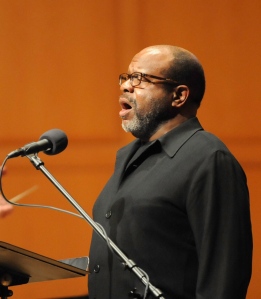
Kevin Deas’ is the voice you hear when you die and go to heaven. Every now and then I come across a performer that uniquely captivates me. Such was the case with Kevin. His gracious demeanor on stage led to a strong bond with our students. He was incredibly honest—talking about hauling furniture after graduating from Julliard, about paying his own airfare to called auditions, about wondering if he could make it in this field. “You have to love this—it must be your passion,” he told us and he demonstrated that passion in every note. When he sang “Goin’ Home,” I was hoping I got to go with him.
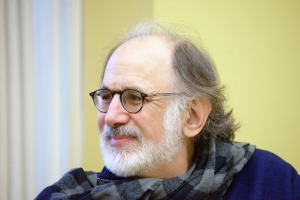
Joe Horowitz’s curmudgeon persona hides a sensitive and caring man. Oh, he earns it with his “standard rants” but underneath is a brilliant man still eager to learn and engage and excite. At our first forum in our ethics center, as cultural appropriation was introduced, Joe seemed bothered. As students related their present day challenges in small-town America, Joe became engaged and the students at my table taught as much as they learned going toe-to-toe in discussions with one of the great cultural historians of our day. Joe’s passion for and belief in what he espouses makes a believer out of nearly everyone he contacts.
Joe’s deep and illuminating work on this subject is so powerful that I learned new ways to hear the music of Dvořák and perhaps more important and tellingly, I came to lament his loss. What if he had stayed? I love Copland but through this I found him a less than authentic substitute for what Dvořák might have been. I mourned the reality that American classical music is different than it could have been had Dvořák’s mantle been successfully picked up or—even better— he had stayed and finished the work himself.
Students’ ability to rise to the occasion never ceases to amaze me. We are used to seeing and hearing students as performers. Here they were that but producers and presenters as well. They dove into this topic and presented ideas and hypotheses and commentary that was provocative and enlightening. For students used to hiding behind an instrument or music score when on stage, having to stand out front and present your thoughts on the works presented is a different challenge altogether (especially in an undergraduate institution.)
Audiences love the deep dive. In a world where much of what we as musicians do is shorten, lighten and otherwise present our music to try to find a way to keep folks engaged in an art form when they are used to three-minute songs, 144-character messages and ten-second commercials, one would think a deep dive into one composer is too much for our severely limited attention spans. Not so. Throughout our time I had community members, students and even faculty say how much they learned and appreciated and even how they had become believers in this way of presenting concerts and festivals.
Music schools are better when they focus on supply and demand. This festival was a reach across the lawn to our colleagues in the liberal arts school and the entire university. Our ethics center was quick to collaborate and our English department chair took an active role—even something seemingly distant from music—athletics— joined in. Our Athletic Director and Head Football Coach moved schedules to join our friends in multi-cultural student services to create a fascinating roundtable entitled Dvořák and the NFL that brought Jon Stewart, Daniel Snyder and American sports together with our 19th-Century musical hero. All of this drove demand for our concerts and recitals. Some people found themselves surprised that these issues were relevant to our lives today. And this music will never lose its relevance.
Doing this is hard. And that, I believe, sadly, is the reason we continue to do the same things year after year hoping things in classical music in America will get better. But they won’t. Not if we don’t change. And change, as we all know, is hard. Music schools are no different from any other classical music producer in our country—we have schedules to fill and audiences to attract and tickets to sell. And we have been doing it for a long time (in DePauw’s case, for 130 years). It is easy to do it “the way it has always been done.” But as we see more and more, though easy, this method is no longer successful.
This festival brought together so many disparate elements of our campus and wider community. It took months (and in Joe’s case, years) of planning and hard work. It was complicated and messy and beautiful and fascinating and worth every moment of every effort.
I learned a lot in the past few weeks thanks to Joe and Kevin and our staff and our faculty and our students. I learned a lot about our past but perhaps more importantly, about our future. And a hopeful one, at that.
21CM is changing Us
With the formal launch of 21CM (the 21st Century Musician Initiative) behind us, I have been amazed to see all the ways it has already changed us and our community. An incredible performance by ETHEL and Robert Mirabal is only the latest in a long line of stellar 21st Century Musicians to visit our campus since we announced. The residency of 5HE continues to rock our world in so many positive ways. New courses, including “State of the Art” and Entrepreneurship are opening eyes and ears each week and our outreach into the community continues to bear fruit. Joe Horowitz joins the many that have referred to these efforts in blog posts, social media and other press. Yet perhaps most rewarding is how it is changing us, individually and collectively. Students have formed their own ensembles including the Bootleg String Ensemble and the “DePops” Orchestra; they have started their own concert series at Mama Nunz restaurant and the Asbury Towers Senior Center; they have performed the music of Pink Floyd and Imagine Dragons at the Indianapolis Prize and they curate our Dvorak Festival.
Recently, the band performed a wonderful concert of great music. To provide variety they had the chamber winds perform Gounod in front of the curtain while a set change took place. Then, a dance company took center stage to dance the music of Eric Whitacre before ending with the seminal La Fiesta Mexicana.
Things are changing here. I can’t wait to see what these young musicians will think of next.
The Joy of Barbara Nissman
Much of our conversation in the School of Music these days has to do with music and musicians of the future. Almost every conversation begins with a tip of the hat to our glorious past, the recognition that “without chops, nothing else matters,” and then we proceed to talk about the future. We talk about how to develop and to engage an audience and what the audience of today has come to expect.
On Wednesday evening, Barbara Nissman gave one of the most captivating and joyful recitals that I have ever witnessed. As I watched and listened in rapt joy and amazement, I came to realize that this is what the audience of to today should expect: music, engagingly introduced and masterfully performed– performed with a conviction and passion reserved for only the very highest expressions of mankind.
It was an amazingly challenging program– Bartók, Liszt, Prokofiev and of course, Ginastera– all performed with a level of mastery that seemed to imply that these works were no more difficult than the John Thompson’s First Grade Piano Book. I watched the first half of the recital from house left so I could see her hands but was far more taken by my seat during the second half, from house right, where I could watch her joyful expressions as she brought this music that she so obviously adored to loving life. At one point, I watch a look and of anticipation on her face as she was about to introduce a second theme. She ushered it in, smiled at its character and then seemed to laugh as that theme was engaged by all the life around it. At another, I watched her pained expression as she prepared a moment of tension in the line and then the joyful release of that tension as the line found its resolution. Hearing Barbara Nissman is a great treat; watching Barbara Nissman while hearing is a rare moment of musical bliss.
This is what audiences should expect, and if we can give it to them consistently, classical music in America will be just fine.
